- Home
- Tricia N. Goyer
Valley of Betrayal Page 5
Valley of Betrayal Read online
Page 5
As the train approached Madrid, the tracks ran through an arid plain—so different from the blooming, bright port town she’d witnessed when entering Spain.
"La Mancha," said a soldier with light blond hair, pointing. "See, the blue mountains? It is Guadarrama, where they fight." The man wore a bandage on his neck, and dried blood stained his collar. She wanted to ask about the battles he'd already seen, but was discouraged by the way he self-consciously placed a hand over the gauze. She wished to know about the danger near Madrid.
"So close." She felt a slight quiver in the pit of her stomach. "Why, they could take the city any day."
Other soldiers stirred, waking; and she grinned, realizing how right Walt had been about them. These young men had seen to her every need, sharing their wine and bread. Singing their traditional songs as she clapped along. Trying to outdo each other with stories of their native regions. And besieging her with questions about America, as if it were as fanciful a place as the lost city of Atlantis.
A morning haze made it hard to distinguish the features of the city, but Sophie could tell from a wide, shadowed skyline of tall buildings that this place offered more than she imagined. She held her breath as the train pulled into the Medio Dio station.
Running her fingers through her hair, her mind raced as she wondered how to find her way to the news office where Michael worked. Would he even be there? Perhaps he'd traveled to another part of the country on assignment. Had he received her telegram, alerting him that she was coming? Who knew if it even got through?
She lugged her satchel down the train steps and scanned the line of horse carts waiting for passengers, when she heard a familiar voice.
"Sophie."
She turned, and there stood Michael. Tears sprang to her eyes, and she didn't know whether to laugh or cry. He opened his arms, and she rushed forward.
"Divina, you made it. I couldn't believe it when your telegram arrived. You're actually here." He kissed both her cheeks, then held her at arm's length. "My darling. Let me get a good look at you."
She laughed, taking in his strong presence and crooked smile. "Michael. Yes, I'm here. And are you a sight for sore eyes."
Michael pulled her close, and with the cadence of his heart against her cheek, tears came—tears of joy to be with him again. And tears of relief, as the fear and tension of the last few days found release within his arms.
The carriage rattled through the narrow cobblestone streets, past aged buildings that seemed to lean on each other for support. It was too much to take in. Michael. Madrid. And the evidence of war around the city. Soon the road widened to a large plaza with a gushing fountain.
"Plaza Canovas del Castillo." Michael leaned close, whispering in her ear. "Better known as the Neptune fountain. Romantic, yes?"
The carriage stopped, and he helped her out, then led her past the fountain and swept his arm toward an elegant, five-story hotel. Above the entrance were the words Hotel Palace in English. "Your castle awaits, my lady."
With its neoclassical architecture, similar to the fine hotels in Paris, it looked like a home for royalty indeed.
"Honestly, Michael. I don't need something nearly this nice. There's no way I can afford it. We can just find a little apartment for me somewhere."
"Darling, did you hear me say anything about cost? I have a friend, you see, who owes me a few favors. Besides, my apartment is right around the corner from here. Don't you want to stay close to me?"
"Are you kidding?" She slid her hand into the crook of his arm. "I never want to part from you again."
After checking into a room and freshening up, she met Michael in the hotel lobby. She could tell from the expression on his face that something was troubling him.
"I'm sorry, Divina, but my editor called. They need me down at the office as soon as possible. I hate leaving you. You just got here, after all. . . ."
"I'll be fine." Sophie feigned a yawn, trying to hide her disappointment. "I am a bit tired. I'll rest, and maybe sketch. When will you be back?"
"How about dinner, here at the hotel?"
"Perfect." She placed a kiss on his cheek. "Now run along and make me proud."
Sophie spent the day sketching the buildings near the hotel. After settling in near the fountain, she discovered she could look every direction in bustling Madrid and find city landscape worthy of her attention.
She ate lunch at a nearby café, where the handsome waiter was more than attentive and complimentary. But her thoughts were only on one man, and the minutes ticked by at a turtle's pace as she waited to see Michael again.
The large, square ballroom of the Hotel Palace was ornately decorated, but a thick cloud of tobacco smoke nearly caused her to choke. Michael, dressed in slacks and a suit jacket, wove through the crowd, leading her to a far corner table.
After settling in the chair across from her, he entwined his fingers in hers and pressed them to his lips. "Darling, look at you—as ravishing as the art you masterfully paint."
She chuckled. "That's interesting, since I paint landscapes."
"Yes, Divina, but didn't Solomon himself relate his love's beauty to the stately trees of the field and flowers of the garden?"
"I think I read something like that." She flipped her dark hair over her shoulder. "But please don't tell me my hair reminds you of a goat."
"Only a prized goat." He grinned. "State fair. Blue ribbon."
Sophie playfully slugged his shoulder, and then turned her attention to her menu. Though her stomach growled, she was even more hungry for someplace quiet where they could talk.
"After dinner, my dear, we've been invited to join my friends for flamenco in Villa Rosa in the Plaza Santa Ana. Don't forget to order coffee—sometimes flamenco sessions last until dawn."
"You're joking, right? People are still going to parties and dancing? There's a war out there. You should have seen all the guns, the soldiers on the roadway, the territories already marked off." She lowered her voice. "Michael, in one city, I saw a body lying near the railroad tracks. . . ."
"Yes, but the fighting's not in full force here. Do you think we're heartless? We’re raising money for the Republican cause."
"So you'll just go on with life as usual until the fighting comes into Madrid? It is coming here, isn't it?"
Michael fingered his wine glass, his eyes suddenly distant. He nodded his head. "Yes, my love." He gently caressed her cheek, softly touching the edges of her curls. "The fighting will be here soon—too soon." He stared into her eyes as if trying to hold her soul in his heart. "And that's why you can't stay."
Sophie, shaking off the thrill of his touch, felt her heart sink. He couldn't mean that. Not after all she’d done to get here. She leaned back in her seat.
"But . . . we’re getting married, and . . ." And what? She hadn't expected a war to disrupt all the plans she'd so carefully arranged in her mind. She clamped her lips tight.
Michael took a sip of his dark red wine, then reached across the table and touched her shoulder with a trembling hand. It was the first time she’d seen him anything but strong and composed.
"Sophie, you're not safe here."
"I'm safe with you." She pressed her fingers to her temples, suddenly weary. Her head throbbed and her stomach ached. "I'm sorry, but I'm not feeling too well. It's been a long couple of days. Do you mind if I go to bed? I'll meet you tomorrow at breakfast?"
Michael held her elbow as she rose. "My love, it's not that I—"
"No, really. Not now. I'm tired. I want to go to my room."
"I understand."
Sophie's hands quivered slightly as Michael escorted her back to the hotel lobby. "When we're both rested, we can talk." She attempted a smile. "I'll feel better in the morning, you'll see."
Sophie finally reached the door to her lavish room, kissed Michael good night, stepped inside, and shut the door behind her. "He's simply trying to consider what's best for me, for us," she mumbled to herself, trying to hold back tears.
/> Flamenco dancing and parties in the midst of war? As she unpacked her tiny satchel, she wondered if she were as prepared for this as she thought.
She hung her only other elegant garment in the closet—a black cocktail dress with a long-sleeved bolero jacket that Michael's mother had helped her pick out. Last, she pulled out her wedding dress. She put it on a hanger and shoved it to the back of her closet.
It will just take a little time, he'll see. Within a week or two things will be back where they were . . . revolt or no revolt.
Chapter Six
Caras vemos, corazones no sabemos.
Faces we can see, hearts we cannot know.
Spanish proverb
Father Manuel Garcia stared at his own rugged visage in the mirror and ran his fingers through dark hair that was just beginning to gray at the temples. In his mind's eye, he pictured himself wearing the blue mono of a soldier's uniform rather than his cassock and collar. He flexed his muscular arm, then turned and lifted his Bible from the hall table. The fight for this truth is the battle God called me to, he reminded himself.
Still, his mind could not help but escape back to the days he roamed the hills of the Basque countryside with his friends. Their chosen enemy changed through the years, depending on what faction controlled Spain at that moment or who most threatened their desire for an independent Basque nation. Had it been almost twenty years ago that their adolescent shoulders bore sticks as guns and they'd used root-knotted clumps of dirt for bombs?
Yet in the quiet solitude of those hills Manuel had also experienced another war—the battle within his soul. Surely an all-knowing God could not have called the son of a simple farmer to the priesthood. In the end, he discovered He had.
Manuel had found God in those mountains, and it was there he returned time and time again to pray. His confessions he had spilled out before the priest in the holy sanctuary, which smelled of candle wax, incense, and polished wood. But his pleadings for communion with the Almighty and his prayers for wisdom took place under the tall pines that reached their branches to the sky, a constant reminder of the evergreen faith of his soul. And though he’d chosen divine service over allegiance to human commanders, Manuel experienced the passion of a soldier surging through his frame as he attended daily a community not far from where he’d grown up.
After his time of spiritual training in Madrid, he'd been sent back here, mainly because outsiders weren't appreciated. Though officially part of Spain, the Basques had a distinct culture and language that few others understood. They were an independent people who believed in strong local rights. Manuel felt especially honored to serve Guernica—the symbolic capital of the three mountainous provinces.
Now he trod to his simple kitchen and sliced a thick piece of bread, delivered this morning by Alfonso, the town's baker. The old wicker of his chair complained audibly as he sat and scooted it closer to the scarred wooden table. He cocked his head to listen as he tuned the radio dial until he distinguished the voice of the Madrid broadcaster through the static. News of conflicts in Madrid and Barcelona seemed distant, as if they were war stories from another country.
A smile curled on his lips as he realized they were one step closer to the independence desired for so long. Just days ago, the government in Madrid had recognized Basque sovereignty. For the elected government of Spain, to fight for the Republicans meant fighting for an independent Basque nation.
But to him, another war waged, a greater, closer war for the seven thousand souls living a simple life in the broad valley that stretched from north to south. Mountains rose around Guernica. A river on one side snaked against a high, forested hill.
Armies battled far away, yet he worried it would not always be so distant. Vivid reports allowed Manuel to see the conflict in his mind's eye. Throughout Spain, the Republican Socialists had led the people to destroy religious objects. In every town, antifascist committee members ordered the people to deliver their images, statues, prayer books, talismans—all to be burned in public.
"San José ha huerto. Saint Joséph is dead!" was the cry that carried through his radio. The saints were dead. And worse, to the people, God had died too. A dios, "with God," was a greeting that had existed as long as the hills of Spain, but that too had been abolished.
Even worse were the Nationalists—the Fascist rebels who once again desired to oppress the people and rule them with an iron fist, keeping them in bondage to the old ways of Spanish society where most of the people lived and died in poverty.
Manuel pushed his bread to the side, no longer hungry. Love your enemies. Bless those who curse you. Weren't those the commands of Christ? Yet Christ had not lived in Spain, which faced more struggles for power and death and destruction than any country should.
He shoved back from the table, rose from his chair, and moved to his modest bedroom, where he fell to his knees on the wooden floor next to his bed. To pray for the people. To pray for their ultimate independence. The Rebels among them sat in prison, giving the people a false sense of security. He prayed for their souls too.
A rapid, light knock on the door stirred Father Manuel from his prayers. He quickly rose and marched to the door to find the Carmelite sister Joséfina waiting outside. She couldn't have been more than twenty years old, with pale skin, dark brown eyes, and flushed cheeks from her trek to his rectory.
"The convent." Her childlike voice pulsed with anxiety. "The government has requisitioned it as a military hospital." She wiped a bead of sweat that trickled from her temple beneath her habit. "The militia is moving us out, Padre, forcing us to a few solitary rooms to live and serve. Perhaps I speak out of turn, but don't they realize the Relifiosas Carmelitas de la Caridad is one of the oldest religious orders in Europe?"
"Yes, Sister. But your prayers for peace can be prayed in a quarter of the space, can they not?"
Sister Joséfina lowered her head. "Yes, Padre."
"In fact, it is good to be used in this way. Hasn't Christ called us to care for those in need?" He gently patted her shoulder, shut his door behind him, and led her to the gate. He could see the large, square convent ahead, one that would stand strong under the most intense gunfire. And one he'd already considered as a possible fortress for his people, should war come to their village.
"After all," he added with a smile, "if the faithful prayers of dedicated nuns can't keep us safe, what can? Come, lead me to the Sisters, and I'll make sure the brides of Christ are treated with the respect they so deserve."
The next day, Sophie attempted to forget the conversation of the previous night. Instead, she strolled with her hand tucked into the crook of Michael's arm as he led her through the streets of Madrid. The entire Castelana, from the Museum of the Prado and the blocks and blocks to follow, were lined by classical palaces and ornate public buildings.
"It's just beautiful." Sophie sighed, noting a circular plaza with trees and fountains. In the middle sat a stone statue of a man on horseback, frozen as if in the midst of running off to battle.
"It is said that the right magical words will awaken the army set in stone. Carved men like this are all over the city, just waiting for the right person to break the spell cast on them."
"Maybe you will be the one to break it." She squeezed his arm. "What do you think the phrase is?"
"Now this I know. 'For the love of a woman,'" he said with a grin.
"Hmmm . . . I like that."
Michael looked every part the photographer with his camera case hanging around his neck, the wide strap secured over his shoulder and across his body. His sleeves were rolled to his elbows and the top three buttons of his white cotton shirt were loosened, showing off the golden brown of his chest.
"So tell me, Divina. I want to hear everything. Just how did you cross the border?"
Michael's eyebrow rose as Sophie related her story.
"You're telling me a strange man approached you, urged you to leave your things behind, and travel with him, lie for him, in order to get across the
border?"
Sophie's fingers stroked the bare skin of Michael's arm as she adjusted her peaked emotions to the sight of him, the sensation of his touch. "Well, it does sound bad when you say it like that, but you don't understand. I had no other choice. The risk paid off, don't you think? If I hadn't met Walt, I'd still be sitting in some hotel lobby in France, instead of being here with you." She walked her fingers down his arm and squeezed his hand. "Besides, I was the one who benefited. He was only thinking of me."
Michael scowled at her. "If you were a Spanish girl, you wouldn't even have considered such a thing. Señoritas aren't even allowed to walk the streets of the city without an escort. Let's just keep this story between us, shall we? I don't want my friends to get any false ideas of the type of woman you are."
"You mean the idea that I'm a modern woman? You sound like the bellman at the hotel. He stopped me in the lobby and urged me to remove my hat and return it to my room. He said only women of wealth wore such things, and it would not be appreciated by the people—they might get the wrong idea about me."
"A hat, that's no trouble. But traveling with a man, alone? That doesn't make me one bit comfortable. And you say he spoke and understood Spanish?"
Sophie hesitated before warily answering. "Yes."
They paused at the street corner while a tram approached, and she studied the political posters that seemed to cover every bare wall and lamppost, shouting their beliefs with shocking images.
In one, a farm laborer-turned-militiaman impaled a monstrous representation of capitalism on his rifle, tossing the monster over his shoulder like a bale of hay. Columna de Hierro. Campesino, la revolución te dará la tierra. "Land worker! The revolution will give you the land."

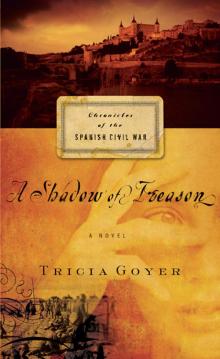 Shadow of Treason
Shadow of Treason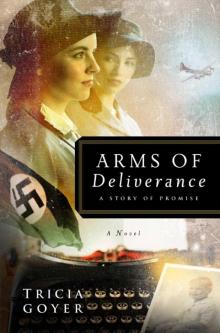 Arms of Deliverance
Arms of Deliverance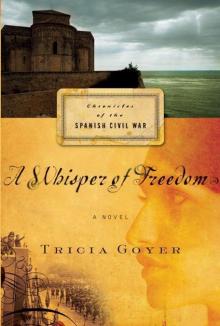 Whisper of Freedom
Whisper of Freedom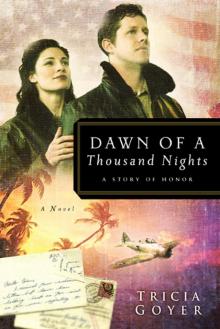 Dawn of a Thousand Nights
Dawn of a Thousand Nights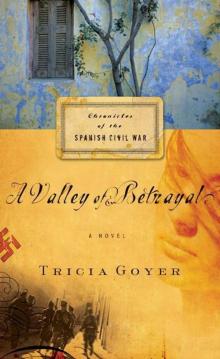 Valley of Betrayal
Valley of Betrayal